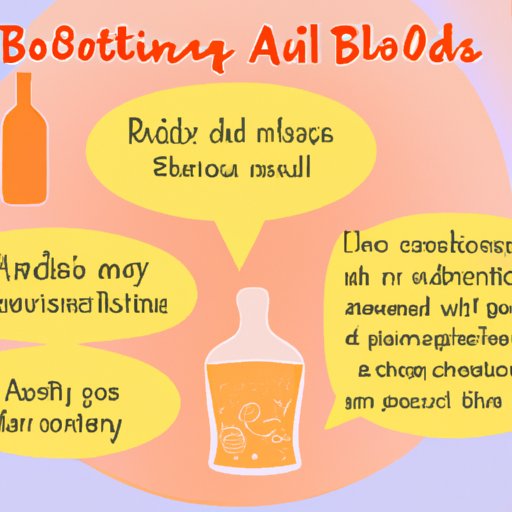
Introduction
Have you ever woken up in the morning feeling bloated and uncomfortable after a night of drinking? It’s a common problem that can leave you feeling sluggish and regretful. But why does this happen, and is there anything we can do to prevent it?
In this article, we’ll delve into the science behind alcohol and bloating, debunk common myths, and offer practical tips for enjoying your night out without the discomfort.
The Science of Bloating: How Alcohol Affects Your Digestive System
When we consume alcohol, it enters our stomach and is quickly absorbed into our bloodstream through the walls of the stomach and small intestine. The liver then works to break down the alcohol, which can cause the digestive system to slow down.
This slowdown can lead to bloating, as food and gases can become trapped in the digestive system for longer periods of time. Additionally, alcohol can irritate the lining of the stomach and intestine, causing inflammation and discomfort.
Studies have also shown that alcohol can alter the balance of bacteria in the gut, which can lead to digestive problems and bloating.
Bloat-Proofing Your Night Out: Tips to Enjoy Alcohol Without the Discomfort
If you’re looking to avoid bloating while drinking alcohol, there are several practical tips you can follow. First, make sure to stay hydrated by drinking plenty of water throughout the night. This can help to prevent constipation and flush out toxins from your system.
You can also try incorporating foods and drinks that are high in electrolytes, such as coconut water or sports drinks. These can help to maintain the balance of fluids in your body, preventing dehydration and bloating.
Another helpful strategy is to eat a balanced meal before drinking. This can slow down the absorption of alcohol, preventing spikes in blood sugar and reducing overall discomfort.
The Connection Between Alcohol and Bloating: Understanding the Link
The type of alcohol you consume can also play a role in bloating. For example, drinks that are high in carbonation, such as beer and champagne, can lead to increased gas in the digestive tract.
Additionally, certain ingredients in alcohol, such as sulfites and histamines, can cause inflammation and allergic reactions in some people, leading to bloating and other digestive problems.
It’s important to understand that other factors, such as your diet and lifestyle, can also contribute to bloating. Foods that are high in salt and sugar, for example, can cause water retention and bloating. Stress and lack of sleep can also wreak havoc on your digestive system.
Debunking Bloating Myths: Separating Fact From Fiction When It Comes to Alcohol
One common myth about drinking and bloating is that mixing different types of alcohol can lead to bloating. However, there is no scientific evidence to support this claim. Bloating is caused by the amount of alcohol consumed, not the type of alcohol.
Another myth is that drinking water with alcohol can reduce bloating. While staying hydrated is important, drinking water with alcohol can actually dilute stomach acid, slowing down digestion and leading to bloating.
Reducing Alcohol Bloat: Simple Tricks for a Happier Stomach
In addition to the tips we’ve already discussed, there are several other strategies you can try to reduce bloating while drinking alcohol. One is to practice mindful drinking, sipping your drink slowly and enjoying it rather than chugging it down quickly.
You can also try limiting your portion sizes, opting for smaller glasses and drinking fewer overall. This can help to mitigate the impact of alcohol on your digestive system.
Finally, it’s important to listen to your body and understand your own individual tolerance levels and limits. If you know that certain types of alcohol or foods cause discomfort, try to avoid them or limit your consumption.
The Hangover-Free Guide to Drinking: How to Avoid Bloating and Other Unpleasant Side Effects
While we can never completely eliminate the negative effects of alcohol, there are several strategies we can use to minimize discomfort and prevent hangovers.
First and foremost, it’s important to drink responsibly, knowing your limits and avoiding excess. You can also try incorporating foods and drinks that are high in antioxidants, such as berries and green tea, to help counteract the damage caused by alcohol.
Finally, giving your body time to recover is crucial. Make sure to get plenty of rest, eat a balanced diet, and take care of your overall health and well-being.
Conclusion
In conclusion, alcohol can certainly cause bloating and other digestive problems. However, by understanding the science behind alcohol and digestion, debunking common myths, and following practical tips, we can enjoy alcohol without the discomfort.
Remember to stay hydrated, eat a balanced meal before drinking, and limit your consumption to listen to your body’s signals. Above all, prioritize your health and well-being to enjoy alcohol responsibly and happily.




